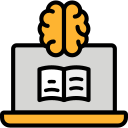Interactivity That Brings Concepts to Life
Diagrams, short videos, and audio snippets turn abstract ideas into concrete experiences. Complex systems, like plate tectonics or neural signaling, become visible and memorable, helping learners revisit tricky concepts without needing a full lecture replay.
Interactivity That Brings Concepts to Life
Cross-references encourage healthy curiosity, guiding readers from one entry to the next along thematic paths. This web of connections mimics expert thinking, revealing how topics relate and teaching students to map knowledge rather than memorize fragments.








